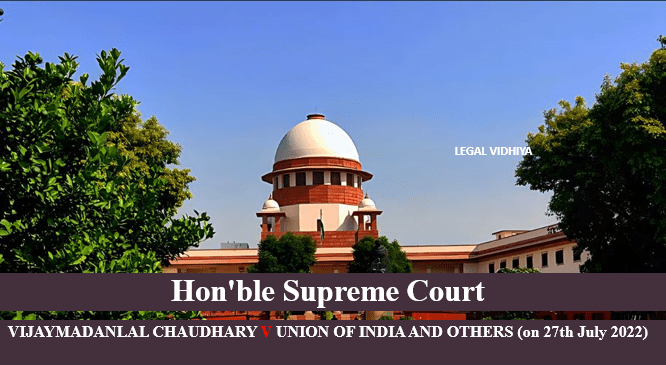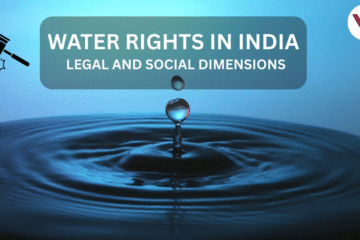
VIJAYMADANLAL CHAUDHARY V UNION OF INDIA AND OTHERS (on 27th July 2022)
Citation – SLP(Crl.) No. 4634 of 2014
Date of Judgement-.July 27, 2022
Court- Supreme Court of India
Case Type- Special Leave Petition (CRIMINAL/CIVIL)
Petitioner- Vijaymadanlal Chaudhary & Ors.
Respondent- Union of India
Bench- Justice AM KHANWILKAR, Justice DINESH MAHESHWARI
Referred- Section-161 , 162 ,145 of 1872 Act , PMLA(Prevention of Money Laundering Act)2002
FACTS OF THE CASE
The Directorate of Enforcement (ED) is a multi-disciplinary organisation mandated to investigate economic crimes and violations of foreign exchange laws.[1] The origin of this Directorate goes back to the year 1956. The statutory functions of the Directorate include enforcement of the following Acts:
1. Prevention of Money Laundering Act, 2002 (PMLA)[2]: ED has been given the responsibility to enforce the provisions of PMLA by conducting an investigation to trace the assets derived from proceeds of crime, to provisionally attach the property and to ensure prosecution of offenders and confiscation of property by the Special court.
2. Foreign Exchange Management Act, 1999 (FEMA): ED has been given the responsibility to conduct an investigation into suspected contraventions of foreign exchange laws and regulations, and to adjudicate and impose penalties on those adjudged to have contravened the law.
3. The Fugitive Economic Offenders Act, 2018 (FEOA): This law was enacted to deter economic offenders from evading the process of Indian law by remaining outside the jurisdiction of Indian courts. It is a law through which the Directorate is mandated to attach properties of fugitive economic offenders who have escaped from India warranting arrest and provides for confiscation of their properties by the Central Government.[3]
Despite having powers of investigation, ED has not been classified as a ‘police agency’ like the Central Bureau of Investigation (CBI). This is also true for other specialised bodies, including the Serious Fraud Investigation Office (SFIO) and the Directorate of Revenue Intelligence (DRI), which are empowered to investigate economic offences under other legislations. These bodies are not obliged to follow the Code of Criminal Procedure Code, 1973 (CrPC).
Nearly 200 petitioners challenged the powers of these specialised investigation agencies that deal with economic offences. The earliest petitions were pending since 2014. More than 80 of these petitions dealt with the PMLA.[4]
On July 27th, 2022 the Supreme Court of India through Vijay Madanlal Choudhary & Ors. versus Union of India & Ors.,[5] decided the constitutionality and upheld the validity of certain challenged provisions which relate to the power of arrest, attachment and search and seizure conferred on the Enforcement Directorate[6] under the Prevention of Money Laundering Act, 2002 commonly known as the PMLA 2002. The judgement is instrumental in as much as it is a further restriction on the rights of the accused under the PMLA and reiterates absolute power granted to the Enforcement Directorate[7] which is already the supervising agency in money laundering proceedings.
ISSUES ALONG WITH ARGUMENTS PRESENTED (important only)
- What does the term ‘Investigation’ provided under Section 2 (na) of the PMLA 2002 entail and imply?
Section 2(na) defines the term ‘Investigation’ as “includes all the proceedings under this Act conducted by the Director or by an authority authorised by the Central Government under this Act for the collection of evidence.”
The petitioners contended that ‘investigation’ is the collection of evidence provided in the Code of Criminal Procedure, 1973 (Cr.P.C.) and thus, any statements made in front of any investigative agency should be hit by Articles 20(3) [8] and Article 21 (Right to life and personal liberty) of the Constitution of India unless the proceedings are in front of an ‘adjudicating authority’ or a ‘court of law’.
However, the Apex Court observed that the expression ‘investigation’ must be regarded as interchangeable with the function of ‘inquiry’ undertaken by the authorities for submitting such evidence before the adjudicating authority. Thus, investigation under PMLA cannot be compared to the import of Investigation under Cr.P.C. Stating so, the Apex Court concluded that any act done in pursuance of an investigation conducted by the officials authorised under PMLA 2002 for the purposes of Section 2(na) would not attract the right guaranteed under Articles 20(3) and 21 of the Constitution of India.
- Bail is the rule, jail is the exception?
Section 45 of PMLA 2002 requires compliance with twin conditions in order to secure bail for a person accused under PMLA 2002. The two conditions are-
- The Public Prosecutor has been given an opportunity to oppose the application for such release; and
- There should be reasonable grounds for believing that the accused is not guilty of any such offence and that the accused is not likely to commit any offence while on bail.
The petitioners in the given case contended that the aforementioned twin conditions provided to secure bail are unconstitutional as being violative of Articles 14 and 21 of the Constitution of India. The two conditions of bail impose an irrebuttable burden on the accused. When a statute provides that bail cannot be issued if there is a reasonable doubt that the accused is guilty, the moment the charges are framed, the accused loses his chance to seek bail. This clearly breaches the fundamental law of criminal jurisprudence which is Bail is the rule, jail is the exception and further imposes an absolute restriction on the Fundamental Right to Life guaranteed under Article 21. This is so much so that the provision of bail as per Section 45 of the PMLA 2002 is far more rigorous compared to the provisions of bail under Cr.P.C. Further, Section 45 also violates the right guaranteed under Article 14 of the Constitution of India as it institutes distinct laws for an essentially same act or omission. It is interesting to note that the Supreme Court has previously declared the alleged twin conditions unconstitutional in Nikesh Tarachand Shah versus the Union of India [9] in the year 2017. However, the Union Government then bought an amendment [10] to the said Section 45 in the year 2018 and the ED claimed the amendment was brought in line with the judgement given in the Nikesh Tarachand Shah case. The petitioners claimed that the said amendment undermined the Nikesh Tarachand Shah Judgement, and re-established the original twin conditions.
The Supreme Court on this above-mentioned point observed that the rigours of bail under Section 45 of PMLA 2002 even though more expansive and restricts the right of the accused to secure bail, do not impose absolute restraint on the grant of bail. The discretion vests in the Court which are not arbitrary or irrational but judicial, guided by the principles of law as provided under Section 45 of the 2002 Act.
- Tainted or Untainted Property- What makes one guilty of Money Laundering?
Section 3 of the PMLA 2002 states —Whosoever directly or indirectly attempts to indulge or
knowingly assists or knowingly is a party or is actually involved in any process or activity connected with the proceeds of crime and projecting it as untainted property shall be guilty of the offence of money-laundering.
Here, the petitioners argued that the offence of money laundering should be said as established only when the property is projected as untainted property.
The Supreme Court however rejected the petitioner’s argument that the offence of Money Laundering under Section 3 of the PMLA 2002 is attracted only if the property is projected as untainted property. The Court held that the word “and” in Section 3 of the PMLA 2002 has to be read as “or”. The Court further moved on to say that Section 3 has a wider reach, capturing every activity directly or indirectly related to money laundering and is not merely related to the final act of laundering the money. Thus, mere possession of the proceeds of crime is money laundering. The offence under Section 3 of the 2002 Act is dependent on the illegal gain of property as a result of criminal activity pursuant to a scheduled offence. However, the authorities under the 2002 Act cannot prosecute any person on a notional basis or on the assumption that a scheduled offence has been committed unless it is so registered with the jurisdictional police or before the competent forum.
- Search and Seizure- A necessary step or another way of misuse of power?
Section 17 of the 2002 Act permits only the Director or any other officer not below the rank of Deputy Director authorised by him to exercise the power of search and seizure on the basis of information in his possession and having reason to believe that any person has committed some act which constitutes money-laundering or is in possession of proceeds of crime involved in money-laundering, including the records and property relating money-laundering.
The petitioners raised their objections against the set procedure under the 2002 Act. They went on to state that Section 17 of the 2002 Act does not provide for magisterial supervision which is an essential tenet of the criminal procedure and endows immense powers to the investigative authority which increases the scope of misuse of such power. The challenge is that, unlike the Cr.P.C., no safeguards for search and seizure have been envisaged under PMLA and that such wide power is being exercised without a formal FIR registered or complaint filed in respect of the scheduled offence. The provision is, thus, unconstitutional and in violation of Articles 14 and 21 of the Constitution of India.
The Apex Court on the above-raised contentions observed that Section 17 of the 2002 Act is not unconstitutional and provides for in-built safeguards, not only mandating the exercise of power by high-ranking officials, of the rank of Director (not below the rank of Additional Secretary to the Government of India who is appointed by a committee chaired by the Central Vigilance Commissioner in terms of Section 25 of the CVC Act) or Deputy Director authorised by the Director in that regard, but also to adhere to other stipulations of recording of reasons regarding the belief formed on the basis of information in his possession about the commission of the offence of money-laundering and possession of proceeds of crime involved in money-laundering. Further, such recorded reasons along with the materials are required to be forwarded by the 3 member Adjudicating Authority (appointed under Section 6 of the 2002 Act headed by a person qualified for appointment as a District Judge) in a sealed cover to be preserved for a specified period, thus, guaranteeing fairness, transparency and accountability regarding the entire process of search and seizure.
JUDGEMENT–
It was held by the SC that ‘projecting’ or ‘claiming’ the proceeds of crime as untainted property is an independent act of indulging in money laundering and that it need not be coupled with concealment, possession, acquisition, or use of proceeds of crime. Amendments to the PMLA between 2015 and 2019 were carried out by way of money bills. Money bills are enacted without the assent of the Rajya Sabha. Amendments to the PMLA, not being a financial matter, ought to have followed the regular process of enactment, instead of following easier way out through money bills. This violates the bicameral structure of the Parliament.
The SC refrained from examining the validity of amendments brought about by the Parliament by taking recourse to money bills as the said issue is pending before a larger bench by virtue of the reference order in Rojer Mathew v. South Indian Bank and Others
REFERENCES-
mondaqlaw.com
Conventuslaw.com
This case analysis is done by Ritvik Dasgupta of Manipal University Jaipur, Intern at Legal Vidhiya.




0 Comments